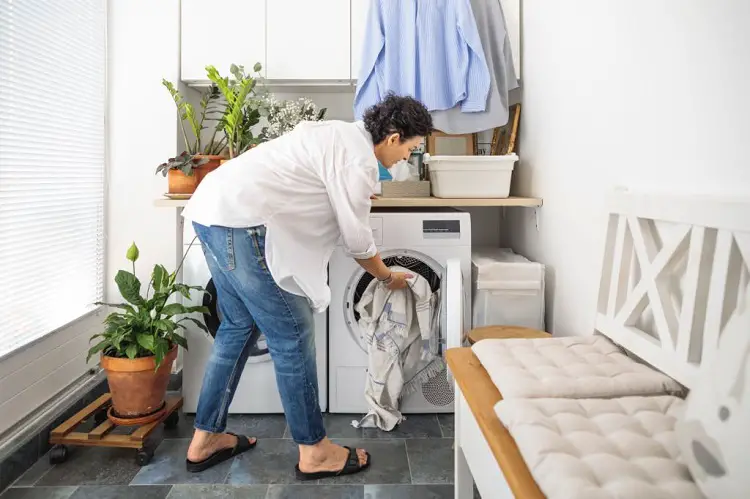Hydrogen sulfide gas is what many people describe as rotten eggs smell.
And it could result from many factors, including a gas leak, mold growth, sulfur in your water supply, a clogged drain system, a dirty washer, a plumbing issue, or a sewage problem.
If you’re wondering why your laundry room smells like rotten eggs, one of the factors discussed in this article should be the cause.
Laundry Room Smells Like Rotten Eggs
The smell of rotten eggs in your laundry room could indicate a gas leak, especially if you use natural gas for your tumble dryer.
Natural gas is odorless, but an odorant called mercaptan is added for easy detection.
Mercaptan has a characteristic odor similar to that of rotten eggs or sulfur.
If the rotten egg smell is from mold or mildew, the fungus releases hydrogen sulfide (H2S) gas.
H2S irritates humans; it can cause mild to moderate discomfort with side effects such as sneezing, headache, dizziness, or coughing.
If your laundry room smells like rotten eggs and you suspect a gas leak, you should do the following:
1. Leave the area:
If you smell gas, leave the area immediately, and do not use electrical switches, household appliances, or telephones, as they are likely to create sparks and ignite gas.
Do not open flame or light match sticks, candles, or any other open flame source.
2. Open windows:
Open all windows and doors to allow more airflow. If you can do it safely, it will help to ventilate the area and disperse the gas. If you can locate the knob, turn off the gas supply to your house at the main gas valve.
3. Call for help if it’s beyond your capability:
A gas leak is quite dangerous and linked to many home fire outbreaks. As such, handling a gas leak as an amateur puts you at risk. Call your gas company’s emergency line or local emergency services to report a gas leak.
They will offer advice and send an expert to assess and resolve the situation in due time. Make sure you make the call a distance away from the leak.
After it’s fixed, do not re-enter the laundry room until the smell has been cleared by a trained professional and is deemed safe.
If the smell isn’t due to a gas leak, it could be caused by other factors like mold or sewer problems.
In such cases, it is important to investigate the source of the odor and take appropriate actions to correct the underlying problem.
Whatever the cause, if you cannot identify or fix the problem on your own, it is best to seek the help of a professional who can diagnose and fix the condition.
Why Does The Laundry Room Smell Like Rotten Eggs?

Aside from gas leaks, there are several reasons your laundry room might have a foul odor similar to rotten eggs. Some of these reasons include:
1. Mould Buildup
Mold thrives in environments with high humidity and is responsible for the smell of rotten eggs in many homes.
The best way to prevent mold growth in an area is to keep that area clean and dry, which isn’t easy to do in the laundry room.
A combination of mycelium and germinating fungi, like mold, a living organism in a moist environment can give off an offensive odor that smells like rotten eggs.
The fungus can thrive in moist areas with temperatures above 40 degrees Fahrenheit and on moist surfaces like wood, carpet, wet walls, and between bricks.
Since mold can appear anywhere in a home, especially in rooms that normally have water and moisture, such as kitchens, bathrooms, or laundry rooms, there is a chance of an odor.
Because of mold’s appearance and dirty texture, it is undesirable in homes and can be more frustrating to see in the laundry room, where the items are supposed to be clean and smell good.
If mold is growing and directly invading your laundry room, there are ways to eliminate the growth and odors accompanying it or the smell of rotten eggs.
2. Dirty Washing Machine
Have you noticed a musty smell from your washing machine or laundry area lately? If you own a top-loading washer, chances are that mold, mildew, or other bacteria have built up over time.
Consider using an antimicrobial odor eliminator to keep your laundry area clean and bacteria-free.
This room odor eliminator from Amazon is the perfect size for a laundry room and is made with all-natural ingredients, free from harmful chemicals or phthalates.
It’s an easy and effective solution to neutralize unwanted odors and airborne microbes caused by mold and mildew.
3. Plumbing Issue
Another common reason why your laundry room may smell like rotten eggs is if the drain line is blocked.
If your laundry room is clean and free of mold and mildew, yet it still smells like rotten eggs, there’s likely an issue with your plumbing. The presence of a plumbing technician may be necessary.
4. Sewer Problem
If your washing machine smells like rotten eggs, it could be due to a drain or sewer problem. The unpleasant odor of sewer gas can seep back into your machine instead of being released if there is a drainage issue.
If you suspect the smell is coming from the sewer, it’s likely because the drain or sewer line is blocked, and the odor travels through the drain hose into your washing machine.
To fix this issue, it may be necessary to seek assistance from a professional.
5. Drain Plug Issue
It is important to ensure that your washing machines are regularly drained. Front-load washing machines, in particular, may develop a foul odor due to a dirty drain plug and filter.
If you suspect the unpleasant smell emanates from the drain plug, locate it on your machine and check if it is stronger in that area.
If you suspect that the plug or filter is the cause of the issue, it is recommended to seek professional assistance. Nonetheless, it is advisable to address the rotten egg smell before the arrival of the professional.
Other Possible Causes Include:
- Presence of sulfur in your water. Sulfur in the water supply can produce hydrogen sulfide gas that smells like rotten eggs.
- Poor ventilation. If your laundry room has poor ventilation, it can trap moisture and contribute to the growth of mold and mildew, which also emit musty and unpleasant smells.
It’s important to identify the root cause of the odor and take appropriate measures to eliminate it, such as cleaning your appliances and improving ventilation.
How To Fix Rotten Eggs Smell in The Laundry Room
While it’s common knowledge that mold and mildew should be cleared as soon as possible, there are steps to reduce the stench emanating from mold in the rest of the laundry room, even before removal.
A popular option is ventilating the laundry room with a fan and natural breeze.
Using an air conditioner in any room that retains heat and humidity can also help, especially in rooms that house many household items like clothing where there’s likely dirt and bacteria from the clothes and the environment.
If your laundry room smells like eggs and you’ve ruled out the possibility of a gas leak, there are several other potential causes for the odor alongside a solution for them.
Here are some steps you can take to address the issues:
Clean Your Washing Machine:
- Run an empty hot water cycle with a cup of vinegar to help clean and disinfect the washing machine’s interior.
- Scrub the rubber seal and detergent dispenser with water and vinegar to remove mold and mildew buildup. You can also add a cup of baking soda to the wash cycle to help neutralize the odor.
- Leave the door open after each wash to allow the interior to dry properly. Always leave the door dry after each use to prevent mold growth.
Check for Any Drain Issues:
- Ensure your washing machine’s drain hose is properly connected and not clogged. A clogged drain can lead to stagnant water and unpleasant smells.
- Consider installing a drain filter to catch lint, debris, and potential odor-causing particles.
Clean The Dryer Vent:
- Lint buildup in the dryer vent can create an odor. Clean the lint trap after each load and periodically check and clean the dryer vent to ensure proper airflow.
Check For Plumbing Issues:
- If the laundry room is connected to a bathroom or has plumbing nearby, check for any leaks or issues that could be causing the odor.
- Run water through infrequently used drains to prevent sewer gas from entering the room.
Address Mould and Mildew:
- Check for signs of mold or mildew on walls, floors, and any damp areas in the laundry room.
- Clean and disinfect these areas using appropriate cleaning products.
- Use a dehumidifier if your laundry room tends to be humid, as high humidity can promote mold and mildew growth.
Ventilation:
- Ensure proper ventilation in the laundry room. Open windows and doors to allow fresh air circulation and help remove odors.
- If your laundry room has an exhaust fan, ensure it works effectively.
Store Detergents Properly:
- Store laundry detergents, fabric softeners, and other cleaning products in a cool, dry place to prevent odors from developing.
Professional Inspection:
- If the smell persists despite your efforts, consider hiring a professional to inspect the area for hidden issues, such as water leaks or structural problems.
Read Also: Can you use a washing machine hose on a water heater?
Conclusion
Identifying the source of the odor is crucial to effectively addressing it. Clean your washing machine with hot water, white vinegar, and baking soda if your laundry room smells like rotten eggs.
Clean your pipes with a specialized cleaner if necessary to remove bacteria buildup. By taking these steps, you can eliminate the odor and enjoy a fresh-smelling laundry room again.
If you’re unsure of how to proceed, it’s a good idea to consult with professionals who can provide expert advice and proof solutions for the problem.

